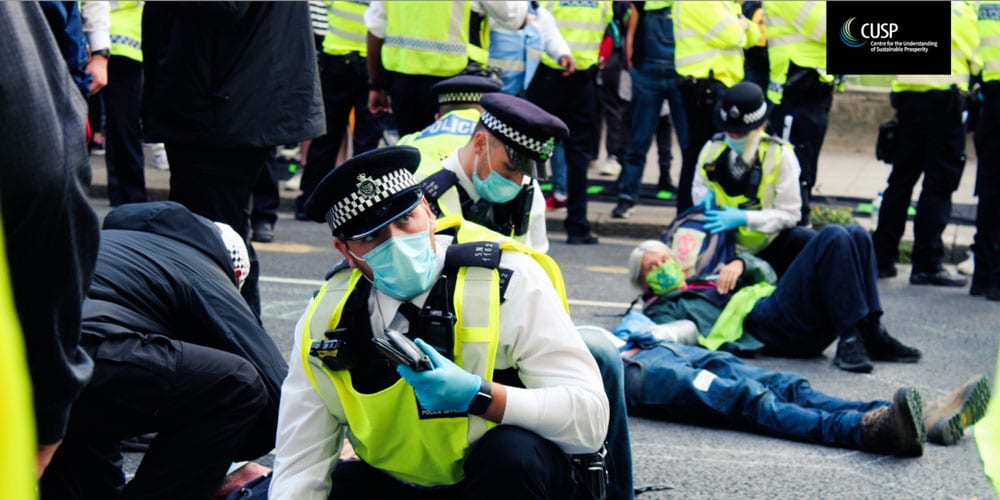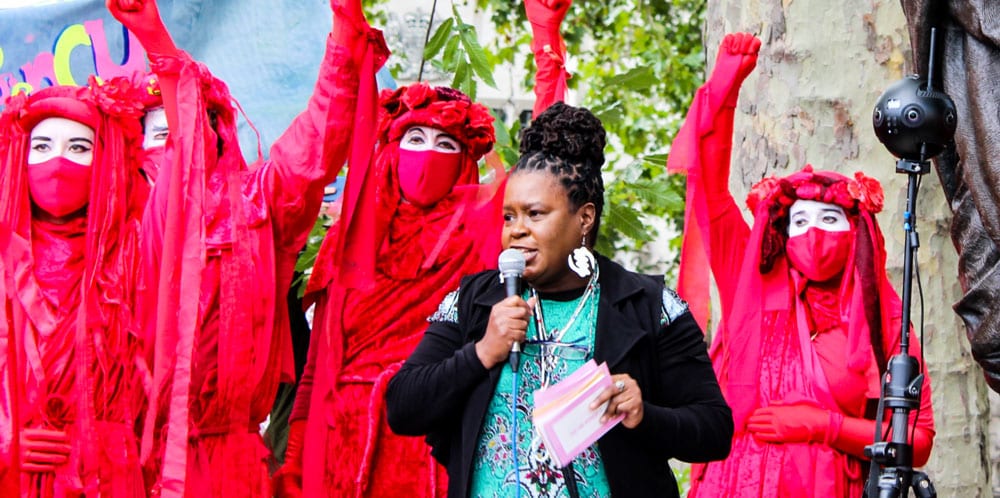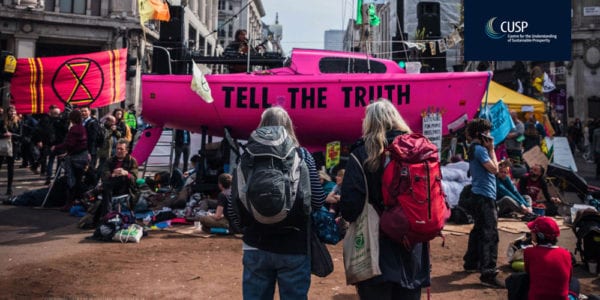XR and the Problem of Accountability: Reflections on the September Rebellion
In the first week of September, XR used similar civil disobedience tactics to its two Rebellions last year—but this time the Met’s policing, on the streets at least, was rapid and effective. Here, CUSP fellow Graeme Hayes reflects on the problems of maintaining ‘accountable’ mass civil disobedience, and argues that XR now has the opportunity to focus on movement-building, rather than mass mobilisations.

There’s a well-known saying which goes something like this: Fool me once, shame on you; fool me twice, shame on me; try it a third time, and there’s no chance it’s going to work.
Since it was formed in late summer 2018, XR’s strategy has revolved around moments of major mobilisation, known as ‘Rebellions’. This strategy is designed to mimic the ‘escalating non-violent tension’ of the US civil rights movement. For XR, escalation means the mobilisation of ever-increasing numbers of activists from Rebellion to Rebellion; the tension is provided by the disruption created by the occupation of public space, and the willingness of ‘Rebels’ to be arrested for acts of civil disobedience (for the most part, for minor public order offences). In the words of co-founder Roger Hallam, the objective is to ‘give the authorities a fundamental dilemma’: either allow XR to claim the streets, or arrest thousands of people and ‘be overwhelmed’. This, in turn, will provide the momentum for political change.
Hallam no longer holds an official position in XR, but in London at least, the basic approach on display at this year’s Rebellion did not differ significantly from this established tactic. Civil disobedience, however, carries with it a problem of public accountability. Political theorists generally argue that accountability is essential because it vouchsafes the ‘civility’, or democratic character, of civil disobedience: in liberal democracies, disobedients must hold themselves accountable for their actions to the state through the criminal justice process. But there is wide dispute over whether public accountability also means that disobedients must be open and transparent about their action prior to undertaking it, or only afterwards. XR’s arrest strategy is classically liberal in these terms, accepting prosecution through the criminal justice process, but it also typically moves between ‘before and after’ accountability. Smaller targeted actions carrying greater risk are generally only accountable after action; mass mobilisations, including the April and October 2019 Rebellions, are accountable both before and afterwards.
Accountability is a key resource for XR: it is a mark of its democratic commitment, and it is a means of creating tension by draining the resources of police and judiciary, in the streets and subsequently the courts. But public accountability prior to action places another of its key resources at risk: information about methods, timing, and targets. In turn, this enables public authorities to plan, prepare, and organise. One reason why XR’s blockade of printing works in Hertfordshire and Merseyside on Friday evening was so effective is that this action was only accountable afterwards: the absence of prior warning was central to the group’s ability to maintain its blockade through the night, and significantly disrupt the distribution of right-wing newspapers on Saturday morning.
In contrast, accountability prior to action enables public authorities to plan, prepare, and organise. This does not of course guarantee that they will do so effectively. It is perhaps a measure of the Met’s lack of experience in dealing with mass civil disobedience that, despite being handed this tactical advantage, its response to the 2019 Rebellions was far from effective. In April 2019, the Met’s policing of XR’s protest was uncertain, laissez-faire, and confused; and in October, whilst the Met had now developed an interventionist street policing plan to arrest activists quickly, its misuse of its own legal powers under section 14 of the Public Order Act 1986 meant that subsequent prosecutions had to be discontinued after judicial review.
The September 2020 Rebellion
This year, XR persisted with the same tactic for the third time: a mass gathering in Parliament Square on the first day of September, with the objective of occupying the streets outside Parliament in support of the Climate and Ecological Emergency Bill, to be presented on 2 September by Green MP Caroline Lucas.
Though there was a strong turnout of Rebels in Parliament Square, this looked to be less than at the start of the April 2019 Rebellion (held on an equally sunny—if pre-COVID—day). And this time, the Met was well prepared. Police were mobilised in very large numbers, ready and waiting for the pre-announced arrival of regional groups converging on Parliament Square at midday. Police immediately cut off the south (Parliament) side of the Square, using mobile barriers. From about 2.30pm, they slowly advanced up the west side of the Square, arresting activists sitting in the road and carrying them one by one to waiting police vans; an hour later, police had advanced about 40 metres, clearing and re-taking the space, moving the barrier up the road, metre by metre. At around 5pm, four activists in the roadway on the North side of the Square locked on, using metal tubes; within minutes, a phalanx of about forty police surrounded them, pushing the Rebels on either side back, and a specialist removal team arrived. Rapidly, the Met used this wedge to clear the east side and hem the remaining Rebels into the north-west corner of the road around the Square.
Throughout the afternoon, police also distributed (or tried to distribute) A4 sheets setting out conditions imposed on the protest under section 14, such that it could only take place in Parliament Square itself, and must end by 7pm on 1 September. By the end of the day, XR was reporting that 252 arrests had been made. The following day, Rebels met again at Parliament Square at 10am, with the intention of blocking PM Boris Johnson’s route from Downing Street to Parliament. Again, the Met quickly intervened, hemming the activists into a small portion of the east side of the road around the Square, and methodically proceeding to arrest activists sitting in the roadway.
The lawfulness of the Met’s action will undoubtedly be tested in court. But for XR, the wider question is whether its foundational tactic can maintain its purchase. If it cannot mobilise ever larger numbers, and cannot hold public space, it can create neither escalation nor tension, or at least cannot do so through mass public disobedience actions. In contrast to the furious backlash from government ministers and hard right commentators that greeted its targeting of newspaper distribution, its mass action in Parliament Square did not attract the media or political attention of previous Rebellions, lacking both novelty and disruption. Moreover, its own concept of democratic accountability has enabled the Met to develop the experience and techniques for dealing methodically and effectively with disruptive non-violent protest, which it will be able to apply to future public protests, whether by XR or other groups. Visibly, the authorities were not in the grip of a ‘fundamental dilemma’ about this.

Accountability, Climate and Racial Justice
There is a further problem of accountability, apparent in a disconnect between the stage and the square. On stage, XR kicked off the Rebellion with speakers from its Internationalist Solidarity Network, including a spokesperson for the Movement for the Survival of the Ogoni People, and a speech by Esther Stanford-Xosei of the Stop the Maangamizi campaign. These speakers projected a very clear message about global climate justice, and from Stanford-Xosei in particular, a demand for reparatory justice (‘we cannot have climate repair without racial justice repair’).
Their speeches were enthusiastically greeted by the crowd in the square. Yet it was hard not to notice the disconnection between the invited speakers and the assembled Rebels themselves: whilst the stage was taken by African diaspora speakers, there were very few people of colour amongst the activists, and even fewer amongst those sitting in the roadway prepared to be arrested. Indeed, everyone sitting in the roadway was, as far as I could tell, white. This isn’t unexpected: it fits with our observations of the court hearings of those Rebels arrested in April 2019, as we note in our recent CUSP report on the profile XR activists. And it brings us to an important issue: the accountability problem of mass civil disobedience is not just a problem of the transfer of informational resources—it is a problem of who can afford to hold themselves publicly accountable through the criminal justice process. Here police tactics come in: there is a stark contrast between the Met’s painstaking clearance of white people from the roadway around Parliament Square with its far more aggressive policing of Black Lives Matter protests earlier this year. It’s laying bare a fundamental question of whose civic status is not and cannot be included in the civic action of civil disobedience.
This point is crucial, because environmental inequalities are also structured by civic status. The COVID-19 pandemic has painfully highlighted the link between social inequality, exposure to environmental pollution, and disproportionate health risk. DEFRA’s Air Quality Expert Group has underlined a probable link between long-term exposure to air pollution and the occurrence or severity of COVID-19 infection; Public Health England finds ‘clear evidence’ that Black and other minority ethnic populations have much higher rates of infection and death from COVID-19 than white ethnic groups; and the negative relationship between social deprivation, health inequality, and poor air quality has long been known to government.
These issues are urgent, and directly relevant to this year’s Rebellion. If passed at some future time, the CEE bill will create Citizens’ Climate Assemblies, a key demand of XR. But as Ingolfur Blühdorn and Michael Deflorian argue in a recent article, there is little evidence that citizens’ assemblies are in fact able to provide the sort of solutions that the climate crisis requires, particularly given the inevitably structural and systemic nature of any solutions designed to address it in any serious way. Instead, they argue, citizens’ assemblies are likely to be co-opted by prevailing forces so that they are emptied of their political potential, and become forums for the ‘collaborative management of sustained unsustainability’.
In these circumstances, a strategy which prioritises the needs and voices of the communities most subjected to climate and environmental injustice is crucial. This means two things. First, more clearly integrating social and environmental injustice in the UK into XR’s developing platform around global climate justice. And second, prioritising the slow strategy of political and community movement-building over holding mass ‘accountable’ Rebellions. There is now some space to do both these things prior to what is likely to be a major opportunity for public and political pressure over climate change at COP26 at the end of next year.



